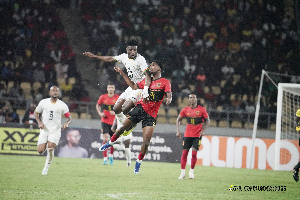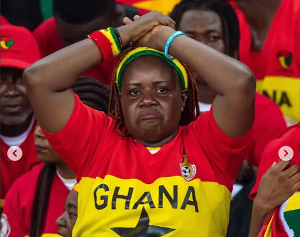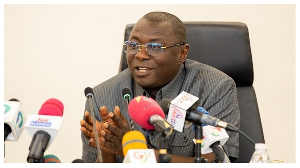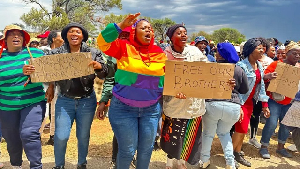It was the beginning of the rainy season and so the piece of land adjacent the former District council which now houses the 31st December Women’s Day Nursery was full of weeds. School children in and around the Bole traditional area were dispatched to the chosen durbar ground to weed and sweep. In their numbers, the children weeded, burnt the grass and swept the ground. Tents were raised and chairs were then placed under the tents in readiness for the next day’s event. The rest of the day was then declared a holiday so that the children could have their uniforms washed and ironed so that they could look sharp for our guest.
In front of the Bolewura’s palace stood the timpanist behind the “atumpan” teaching two school boys how to play the drums to sing the appellations of our guest. At the entrance into the palace stood two horses; a white and a brown one. They had just been washed and henna was being applied to the feet of the white horse. Hanging on the side were medieval costumes for the two horses including reigns, saddles and shoes which were being cleaned. The whole village was agog with activity all in preparation for the one guest who was making his second visit. The first time he came, school children in first and second cycle institutions were thought how to sing “Arise Ghana Youth!” Those were the days of the revolution. When he comes this time, he will not be regurgitating the ideals of military adventurism: his message will not seek to expound the ideals of revolutionary socialism but to expunge them. It will be a message intertwined in a labyrinth of democratic ideals: ideas that will shape the democratic credentials of Ghana.
The following day, the school children from the various schools matched from their respective schools down to the durbar grounds. With their feet painted in the red dust from the untarred streets in the town, they gathered at the durbar ground in waiting for their guest. There were those from the surrounding villages who came on the backs of Lorries, and bicycles. The two main women’s social groups were on the ground. One could literally sense the rivalry and acrimony between them as they stood at opposite ends of the ground competing to be the cynosure of all eyes. They were also groups of school children clad in different traditional outfits symbolising the diverse ethnic groups in the area. The mixture of the humming drums and the melodic sound of the xylophones were deafening. Shortly after the Bolewura and his entourage took their seats, the cacophony increased. Then almost simultaneously, I saw the crowd surging towards one direction. When I bothered to look in that direction, I saw a motorcade of about 15 Pajeros heading towards the durbar ground. They were driving at almost 80 miles per hour oblivious of the danger they were posing by that act of recklessness to the children playing football nearby.
When they finally stopped, two men clad in camouflage uniforms jumped out of the first Pajero and made their way back towards the car behind them. One of them opened the door and a bespectacled middle-aged light skinned man popped out of the car. Then shouts of “JJ, JJ, JJ” filled the air. Our guest had arrived!
It was what happened after Rawlings had delivered his speech and bidding us bye that caught my attention. I was standing behind a well-known sexagenarian in the town when Rawlings went round shaking hands and saying his goodbyes. When Rawlings got to where we were standing I saw the man desperately trying to shake hands with Rawlings. And when Rawlings finally shook hands with him, one could literally see the sigh of relief in the man’s eyes. He then ran his hands on his face, down his torso to his feet. I stood there a little flabbergasted. As far as I knew, that gesture is done only when an otherwise wayward child of God returns and confesses his sins to a pontiff and is accepted back into the house of God. And by that gesture, the otherwise prodigal son asks God to bestow his zephyr upon him so that he will remain in God’s fold.
Until the dynamisms of charism became known to me, I did not understand why the man should feel “blessed” by a mere mortal like Mr Rawlings. But Rawlings has always had these charismatic powers. I have seen people who are willing to fight blood and fire in defence of Mr Rawlings. I have seen people who accept everything Rawlings does as a yardstick by which everything else must be measured. For them Rawlings is infallible. Infact Rawlings is to some Ghanaians what Obama is to the world. Of course this metaphor does not in any way allude to Obama’s oratorical prowess. Just the charisma.
It was that charisma that made it possible for Mr Rawlings to stage two successful coups. In his speech which catapulted him to power in a rule that lasted almost two decades, Rawlings declared inter alia “Fellow Ghanaians, the time has come for us to restructure this society in a real and meaningful democratic manner so as to ensure the involvement and active participation of the people in the decision-making process”. The irony was that, whilst he was talking of restructuring Ghana in a “democratic manner”, he was apparently oblivious of the fact that he had only just usurped power from a man who was democratically elected.
And in his attempt to justify the 1979 coup, Mr Rawlings said “... This has been the most disgraceful government in the history of our country. It is the only one in recent times that criminals and such others like them have become respectable in our society. They have turned our hospitals into graveyards and our clinics into death transit camps where men, women and children die daily because of lack of drugs and basic equipment. To many of us, democracy does not just mean paper guarantees of abstract liberties. It involves, above all, food, clothing, and shelter in the absence of which life is not worth living.” Having succeeded in cajoling us to buy into his vision, Rawlings then laid the foundations of his authoritarian regime. In a rule that span almost two decades, we were exposed to what Rawlings could offer. Undeniably, Rawlings did a lot to better the lot of Ghanaians: It was during his regime that electricity was extended to some of the remotest parts of Ghana. I have heard a few people attempt to argue that the Rural Electrification Project has no economic merit. They argue that what is the point in taking electricity to a village where the average person cannot afford a square meal let alone pay for his electricity bill? To such people I say, it is one of the shallowest arguments I have heard within living memory. Is the welfare of the people not the responsibility of the government? Access to potable water, electricity and housing is an inalienable right of every Ghanaian irrespective of tribe, creed or geographical location. It is a right and not a privilege that the people of Nankpanduri have the same quality of life as the people in Accra: a child in Mampongten must not be denied access to electricity just because Mampongten hasn’t as much gold as Obuasi. Government will be failing in its social responsibilities if it tows that line of thinking.
Of course Mr Rawlings also made tremendous in-roads in areas such as the construction of roads, and the promotion of the tourism potentials of Ghana. The relative peace we enjoyed during his reign is something we cannot take for granted. And to cap it all, he peacefully handed over power to Kuffuor. Whether we like it or not, that was one of his greatest feats. We will like to argue that it was a constitutional requirement that he handed over power to Mr Kuffuor. Yes that is true. But this was a man that came to power through the barrel of the gun. In the same vein, the man could have done what he is adept at doing: suspend the constitution and return us to his days of military adventurism. But he didn’t. He calmly handed power over to Mr Kuffuor thus placing the name of Ghana (yet again) deep into the annals of history. Adams S Yakubu dangonja@googlemail.com
Opinions of Thursday, 15 October 2009
Columnist: Yakubu, Adams Sheriff


















